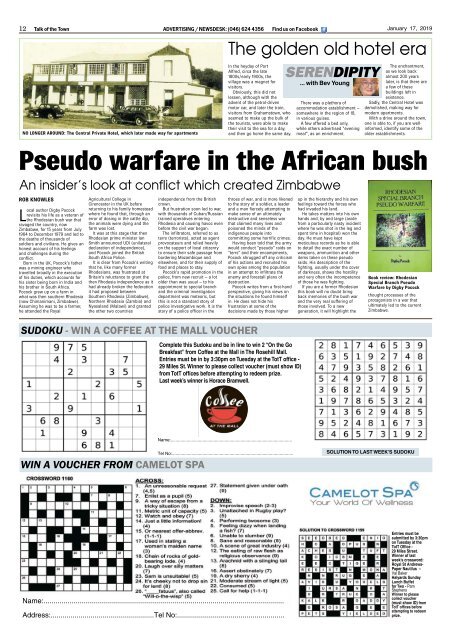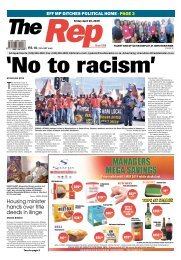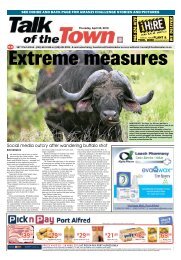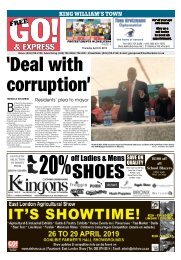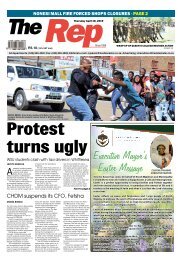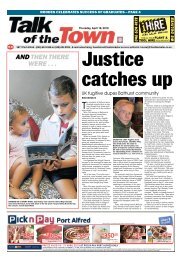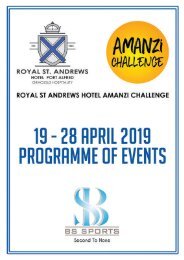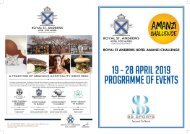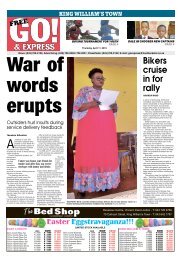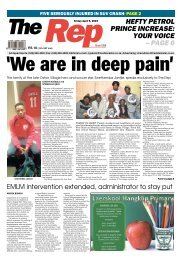TOTT 17 January 2019
Create successful ePaper yourself
Turn your PDF publications into a flip-book with our unique Google optimized e-Paper software.
12 Talk of the Town ADVERTISING / NEWSDESK: (046) 624 4356 Find us on Facebook<br />
<strong>January</strong> <strong>17</strong>, <strong>2019</strong><br />
NO LONGER AROUND: The Central Private Hotel, which later made way for apartments<br />
The golden old hotel era<br />
In the heyday of Port<br />
Alfred, circa the late<br />
1800s/early 1900s, the<br />
village was a magnet for<br />
visitors.<br />
Obviously, this did not<br />
lessen, although with the<br />
advent of the petrol-driven<br />
motor car, and later the train,<br />
visitors from Grahamstown, who<br />
seemed to make up the bulk of<br />
the tourists, were able to make<br />
their visit to the sea for a day,<br />
and then go home the same day.<br />
SERENDIPITY<br />
... with Bev Young<br />
There was a plethora of<br />
accommodation establishment –<br />
somewhere in the region of 18,<br />
in various guises.<br />
A few offered a bed only,<br />
while others advertised “evening<br />
meal”, as an enrichment.<br />
The enchantment,<br />
as we look back<br />
almost 200 years<br />
later, is that there are<br />
a few of these<br />
buildings left in<br />
e x i st e n c e .<br />
Sadly, the Central Hotel was<br />
demolished, making way for<br />
modern apartments.<br />
With a drive around the town,<br />
one is able to, if you are wellinformed,<br />
identify some of the<br />
older establishments.<br />
Pseudo warfare in the African bush<br />
An insider’s look at conflict which created Zimbabwe<br />
ROB KNOWLES<br />
Local author Digby Pocock<br />
revisits his life as a veteran of<br />
the Rhodesian bush war that<br />
ravaged the country, now<br />
Zimbabwe, for 15 years from July<br />
1964 to December 1979 and led to<br />
the deaths of thousands of<br />
soldiers and civilians. He gives an<br />
honest account of his feelings<br />
and challenges during the<br />
conflict.<br />
Born in the UK, Pocock’s father<br />
was a mining engineer who<br />
travelled broadly in the execution<br />
of his duties, which accounts for<br />
his sister being born in India and<br />
his brother in South Africa.<br />
Pocock grew up on a farm in<br />
what was then southern Rhodesia<br />
(now Chimanimani, Zimbabwe).<br />
Assuming he was to be a farmer,<br />
he attended the Royal<br />
Agricultural College in<br />
Cirencester in the UK before<br />
returning to his family homestead<br />
where he found that, through an<br />
error of dosing in the cattle dip,<br />
the animals were dying and the<br />
farm was lost.<br />
It was at this stage that then<br />
Rhodesian prime minister Ian<br />
Smith announced UDI (unilateral<br />
declaration of independence),<br />
and Pocock joined the British<br />
South Africa Police.<br />
It is clear from Pocock’s writing<br />
that he, like many former<br />
Rhodesians, was frustrated at<br />
Britain’s reluctance to grant the<br />
then Rhodesia independence as it<br />
had already broken the federation<br />
it had proposed between<br />
Southern Rhodesia (Zimbabwe),<br />
Northern Rhodesia (Zambia) and<br />
Nyasaland (Malawi) and granted<br />
the other two countries<br />
independence from the British<br />
crown.<br />
But frustration soon led to war,<br />
with thousands of Cuban/Russian<br />
trained operatives entering<br />
Rhodesia and causing havoc even<br />
before the civil war began.<br />
The infiltrators, referred to as<br />
terrs (terrorists), acted as agent<br />
provocateurs and relied heavily<br />
on the support of local citizenry<br />
to ensure their safe passage from<br />
bordering Mozambique and<br />
elsewhere, and for their supply of<br />
food and places to stay.<br />
Po c o c k ’s rapid promotion in the<br />
police, from new recruit – a lot<br />
older than was usual – to his<br />
appointment to special branch<br />
and the criminal investigation<br />
department was meteoric, but<br />
this is not a standard story of<br />
police investigative work. It is the<br />
story of a police officer in the<br />
throes of war, and is more likened<br />
to the story of a soldier, a leader<br />
and a man fiercely attempting to<br />
make sense of an ultimately<br />
destructive and senseless war<br />
that claimed many lives and<br />
poisoned the minds of the<br />
indigenous people into<br />
committing some horrific crimes.<br />
Having been told that the army<br />
would conduct “pseudo” raids on<br />
“terrs” and their encampments,<br />
Pocock shrugged off any criticism<br />
of his actions and recruited his<br />
own spies among the population<br />
in an attempt to infiltrate the<br />
enemy and forestall plans of<br />
dest ruction.<br />
Pocock writes from a first-hand<br />
perspective, giving his views on<br />
the situations he found himself<br />
in. He does not hide his<br />
frustration at some of the<br />
decisions made by those higher<br />
up in the hierarchy and his own<br />
feelings toward the forces who<br />
had invaded his land.<br />
He takes matters into his own<br />
hands and, by and large (aside<br />
from a particularly nasty incident<br />
where he was shot in the leg and<br />
spent time in hospital) won the<br />
day. He must have kept<br />
meticulous records as he is able<br />
to detail the exact number of<br />
weapons, ammunition and other<br />
items taken on these pseudo<br />
raids. His description of the<br />
fighting, usually under the cover<br />
of darkness, shows the hostility<br />
and very often the incompetence<br />
of those he was fighting.<br />
If you are a former Rhodesian<br />
this book will no doubt bring<br />
back memories of the bush war<br />
and the very real suffering of<br />
those involved. To a new<br />
generation, it will highlight the<br />
Book review: Rhodesian<br />
Special Branch Pseudo<br />
Warfare by Digby Pocock<br />
thought processes of the<br />
protagonists in a war that<br />
ultimately led to the current<br />
Zimbabwe.<br />
SUDOKU - WIN A COFFEE AT THE MALL VOUCHER<br />
<br />
<br />
<br />
<br />
<br />
<br />
Name:...................................................................................................<br />
WIN A VOUCHER FROM CAMELOT SPA<br />
Tel No:...................................................................................................<br />
SOLUTION TO LAST WEEK’S SUDOKU<br />
Name:.........................................................................................................................<br />
Address:....................................................Tel No:......................................................<br />
Entries must be<br />
submitted by 3:30pm<br />
<br />
<br />
<br />
<br />
<br />
<br />
ă<br />
Val Baker<br />
<br />
<br />
Pam<br />
Stephens<br />
<br />
<br />
from


